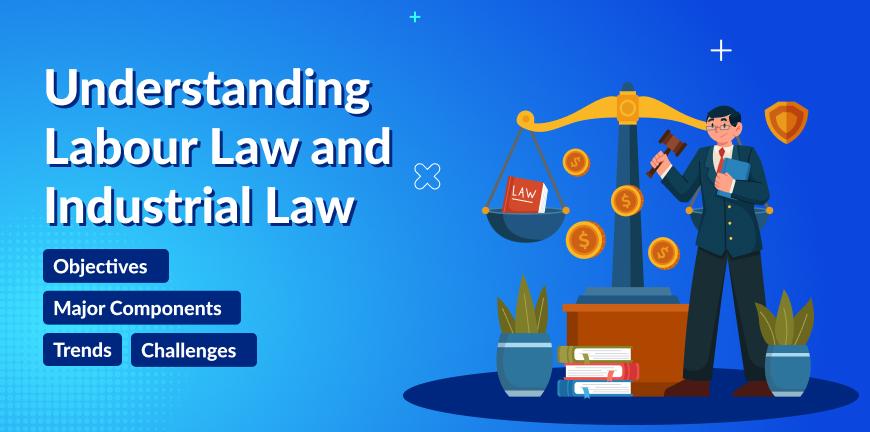
How to Handle Payroll for Contract Employees: a Step-By-Step Guide (2026)
06/05/2025
What Is Professional Tax in Compliance? Challenges & Best Practices
07/05/2025- What are labour and industrial laws?
- What are the main objectives of labour and industrial laws?
- Which are the most important labour and industrial laws in India?
- Major Components of Labour and Industrial Laws
- How Labour and Industrial Laws Impact Businesses?
- What are the Recent Changes and Trends in Labour Laws?
- What are the Challenges in Implementing Labour and Industrial Laws?
- What are the Best Practices for Compliance with labour and industrial laws?
- Are you looking Compliance Partner?
- Frequently Asked Questions
To become branded as a successful company in India, just declaring profits will not suffice. Adhering to laws and regulations is also equally important, if not more. Although most companies claim that they have expertise in labour and industrial law procedures, in reality, it is far more complicated and requires due diligence and significant efforts to understand and implement them seamlessly. Let’s take a deep dive and understand labour and industrial laws and their relevance in the current business landscape to make informed decisions and achieve 100% compliance.
What are labour and industrial laws?
Labour and industrial laws are a set of regulations developed under the Indian constitution to regulate the conditions under which employees and employers operate in the workplace. The Labour and Industrial Law Act protects the rights of the labour force and ensures they are treated fairly and equally within the organisation’s premises. The key elements of the labour and industrial law manual include:
- Workplace health and safety
- Employment standards
- Labour management relations
- Protection of employee rights
- Industrial Relations
- Social Security and Welfare
- Special Provisions
Any violation committed against labour and industrial laws by the employer can lead to serious consequences like lawsuits, penalties, fines, and sometimes even imprisonment in extreme cases.
What are the main objectives of labour and industrial laws?
The main objectives of labour law and industrial law include:
- To enforce labour and industrial laws in a simplified manner.
- Ensuring industrial peace by resolving disputes and complaints between employees and employers.
- Work towards providing social security to unorganized sector workers.
- Ensure child labourers are released and rehabilitated.
- To develop and implement various welfare schemes for underprivileged labourers.
- To develop policies and procedures to ensure that people seeking employment are given equal opportunities regardless of their background.
- To maintain transparency while providing various services to Indian citizens.
- To facilitate a labour market that supports economic growth, investment, employment creation, and a safe working environment for all.
- Standardise the employment conditions.
- Ensuring organisations achieve compliance and if they fail, take necessary actions to resolve them.
Which are the most important labour and industrial laws in India?
Here is the list of major labour and industrial laws applicable in India under different categories:
Wage and Incentives
- The Minimum Wages Act 1948
- The Payment of Bonus Act 1965
- The Payment of Wages Act 1936
Employee Basic Rights and Working Conditions
- The Factories Act 1948
- Mines Act 1952
- Indian Railways Act 1890
- Plantation Labour Act, 1951
Industrial Relations and Dispute Resolution
- Industrial Disputes Act 1947
- Trade Unions Act 1926
- Industrial Employment (Standing Orders) Act 1946
Specific Sectors
- The Shops & Commercial Establishments Act (applicable under both the state and central governments)
- Unorganized Workers’ Social Security Act, 2008
- Contract Labour (Regulation and Abolition) Act, 1970
Social Security
- Employees’ State Insurance Act (ESI Act) 1948
- Employees’ Provident Fund and Miscellaneous Provisions Act 1952
- Workmen’s Compensation Act 1923
- Payment of Gratuity Act 1972
- Maternity Benefit Act 1961
Recent Developments
- Industrial Relations Code 2019
- Code on Wages 2019
- Occupational Safety, Health and Working Conditions Code, 2020
- Code on Social Security, 2019
Major Components of Labour and Industrial Laws
The critical components of the Labour and Industrial Law Act include:
1. Employment
Previously, Labour and Industrial Law Procedures were centred around reducing unemployment on a large scale, but contemporary labour and industrial laws emphasize creating employment opportunities for economic stability and GDP growth.
2. Wages and Remuneration
The wage and bonus-related labour laws offer protection against unlawful deductions, ensure minimum wage payments, and regulate income policies leading to economic stability and welfare of employees.
3. Individual Employment Relations
Labour law and industrial law ensure that employer and employee relations are well-maintained. The areas such as termination, notice period, minimum wages, medical benefits, and social security are regulated under labour and industrial laws.
4. Working Conditions
According to the labour and industrial law manual, working conditions for employees should be maintained under certain standards. The areas covered under this component include working hours, leaves, special provisions for women, child labour prohibition, vacations, etc.
5. Health, Safety, and Welfare
Safety, occupational health, and welfare are crucial aspects of the workplace. Labour and industrial laws regulate them to ensure the best working conditions are provided to employees to perform their tasks. The laws encourage the use of PPE (Personal Protective Equipment), regular maintenance of equipment and machinery, reduce radiation risks, create a safe working environment for women by preventing sexual harassment, etc.
6. Social Security
It includes the employer’s liability for accidents and injuries to providing social security benefits to employees, such as medical insurance, EPF, ESI, maternity benefits, etc.
7. Administration of Labour Law
It regulates the governing and functioning of labour departments, auditing services, and other enforcement agencies. It also includes the addressing and settling of industrial disputes between labour and employers.
8. Trade Unions and Industrial Relations
The importance of industrial relations and labour laws encompasses the representation of employees through the creation of unions, legal aspects of trade unions, prevention and settlement of labour disputes, etc.
9. Special Categories of Workers
Labour laws have provisions to protect special categories of workers, such as transportation, mining, agriculture, etc.
How Labour and Industrial Laws Impact Businesses?
Labour and industrial laws affect businesses in several ways:
1. Wages & Working Hours
Under the Labour and Industrial Law Act, employers must pay a minimum wage and overtime pay based on the type of role and industry. Additionally, employers must fix working hours that constitute 40 hrs/week, and any additional hours must be compensated through monetary or leave benefits. These restrictions increase overall costs for companies and will impact their profitability.
2. Safety Standards and working conditions
One of the major Industrial Law implementation steps includes the creation of a safe working environment for employees. The employers must provide protective suits and run regular maintenance of machinery to prevent injuries and accidents. All these protocols increase the expenses for employers, creating a significant impact on profitability and future investments.
3. Compliance requirements
All companies that operate in India must ensure 100% compliance with labour and industrial laws to prevent penalties, hefty fines, and lawsuits. To ensure this, companies must conduct regular audits to fix errors and streamline operations to meet regulatory requirements. This requires additional investment and human resources, which can reduce profitability and liabilities.
What are the Recent Changes and Trends in Labour Laws?
The recent trends and changes in Labour laws include:
1. Labour Codes Implementation
The 4 Labour Codes encompassing Code on Wages 2019, Code on Social Security 2020, Industrial Relations Code, 2020, and Occupational Safety, Health, and Working Conditions Code, 2020 are set to be implemented in 2025. These codes are aimed at codifying and consolidating 29 central legislations related to labour, social security, and industrial matters. After the implementation of these Labour Codes, compliance and labour standards requirements will be uniform across India.
2. Strengthening regulatory frameworks to protect gig and platform workers
In recent years, the Ministry of Labour and Employment has been putting a lot of effort into strengthening labour laws to provide benefits for gig and platform workers. It is anticipated that strong welfare schemes will be rolled out in 2025 to provide social security benefits for platform and gig workers.
3. Announcement of incentive schemes related to employment
During the Union Budget 2024-25, the central government has announced 3 incentive schemes linked to employment. The schemes include 1 month’s wages up to Rs. 15,000 in 3 instalments for all first-time employees, the creation of jobs in the manufacturing sector through the reimbursement of social security contributions of both employees and employers for a period of 4years, and support employers by reimbursing their share of social security contributions of up Rs.3000 per month for 24 months.
What are the Challenges in Implementing Labour and Industrial Laws?
The challenges in implementing labour and industrial laws include:
- Most companies lack the resources and personnel to deal with labour law and industrial law compliance issues, leading to employee dissatisfaction and high rates of disputes.
- Medium and large-scale enterprises must deal with numerous laws and regulations related to labour from both the state and central governments. Unfortunately, most companies lack expertise in handling compliance issues and navigating through complex labour law regulatory frameworks.
- Most organisations are unaware of the laws and regulations applicable to their industry. This unfamiliarity can lead to a lot of compliance issues and invite legal troubles and penalties.
- Most companies don’t use technology to its maximum capacity and still follow traditional methods of data storage and policy management. Without automation, ensuring compliance in medium to large-scale industries and almost impossible.
- Most organisations are oblivious to the latest updates and amendments to labour and industrial laws. It leads to non-compliance since most operational procedures and policies are not updated to match the current compliance requirements.
What are the Best Practices for Compliance with labour and industrial laws?
The best practices to ensure compliance with the Labour and Industrial Law Act include:
1. Conduct Regular audits
To mitigate potential risks and non-compliance issues at an early stage, companies must conduct regular audits with an in-house team or a third-party compliance agency such as ALP Consulting. This move will be beneficial in achieving 100% compliance and also streamlining the operations and procedures, leading to more productivity and profitability.
2. Employee Training and Awareness
The companies must educate and create awareness of Labour and Industrial Law Procedures among employees and managers. Regular training sessions will help employees ensure compliance and stay up to date with the latest changes in labour law and industrial law.
3. Maintain accurate records
Companies must ensure every transaction and activity within the workplace is accurately recorded and stored in a secure database, as it is major evidence to prove compliance with government agencies.
4. Develop comprehensive compliance policies
Companies must roll out a comprehensive compliance policy and procedures document to all employees and managers and ensure everyone follows the guidelines without fail.
5. Leverage technology
Companies must leverage technology and ensure most operations, like payroll, production operations, benefits management, etc., are automated as much as possible to reduce human errors and increase compliance.
Are you looking Compliance Partner?
Labour and Industrial Law Procedures are complicated, and achieving compliance through an in-house team is time-consuming and may not bring about the desired results in terms of compliance and streamlining the operations according to the latest labour law regulations. ALP Consulting, a leading compliance agency in India, offers end-to-end labour law and industrial law compliance services for startups and Fortune 500 companies. By partnering with us, you can hand over the responsibility of achieving compliance to us and concentrate on other core activities to improve productivity and profitability.
Frequently Asked Questions
1. What is the difference between labour law and industrial law?
The difference between labour law and industrial law is that labour law regulates the conditions between employer and employees, whereas industrial law is a broader term that includes labour laws and extends to industrial relations like the creation of trade unions, resolving industrial disputes, and preventing labour unrest.
2. What is the labour and industrial law?
Labour and industrial law is a legal framework designed by government bodies to regulate the conditions between employees and employers. Most labour laws are designed to protect the rights of employees and create obligations for employers to provide the best working conditions for their workforce.
3. What are the 4 labour laws in India?
The 4 labour laws in India include the Code on Wages 2019, Industrial Relations Code 2020, Code on Social Security 2020, and Occupational Safety, Health and Working Conditions Code 2020.
4. What are the penalties for breaking labour laws?
The penalties for breaking labour and industrial laws include hefty penalties and fines ranging from a few thousand to lakhs, civil and criminal lawsuits, imprisonment, and in some cases, closure of business.
5. How do industrial laws protect workers?
The Labour and Industrial Law Procedures protect the rights of employees by creating various standards to which employers follow and provide the best working environment and benefits to their employees. Any violations by employers of labour laws can cause serious troubles like lawsuits, fines, and imprisonment.
6. What are some common labour law violations?
Common labour law violations include failing to pay minimum wages and overtime, providing an unsafe working environment, child labour, non-compliance, unfair treatment and harassment of employees, discrimination, etc.

Hariharan Iyer
Hariharan Iyer is the Vice President – Operations at ALP Consulting, bringing over 40+ years of experience in HR outsourcing and labour law compliance. He leads end-to-end HRO operations, ensuring process efficiency, statutory compliance, and seamless service delivery for clients across industries. With a strong background in labour law governance and workforce management, Hariharan plays a key role in driving operational excellence and compliance-led HR solutions at ALP Consulting.




